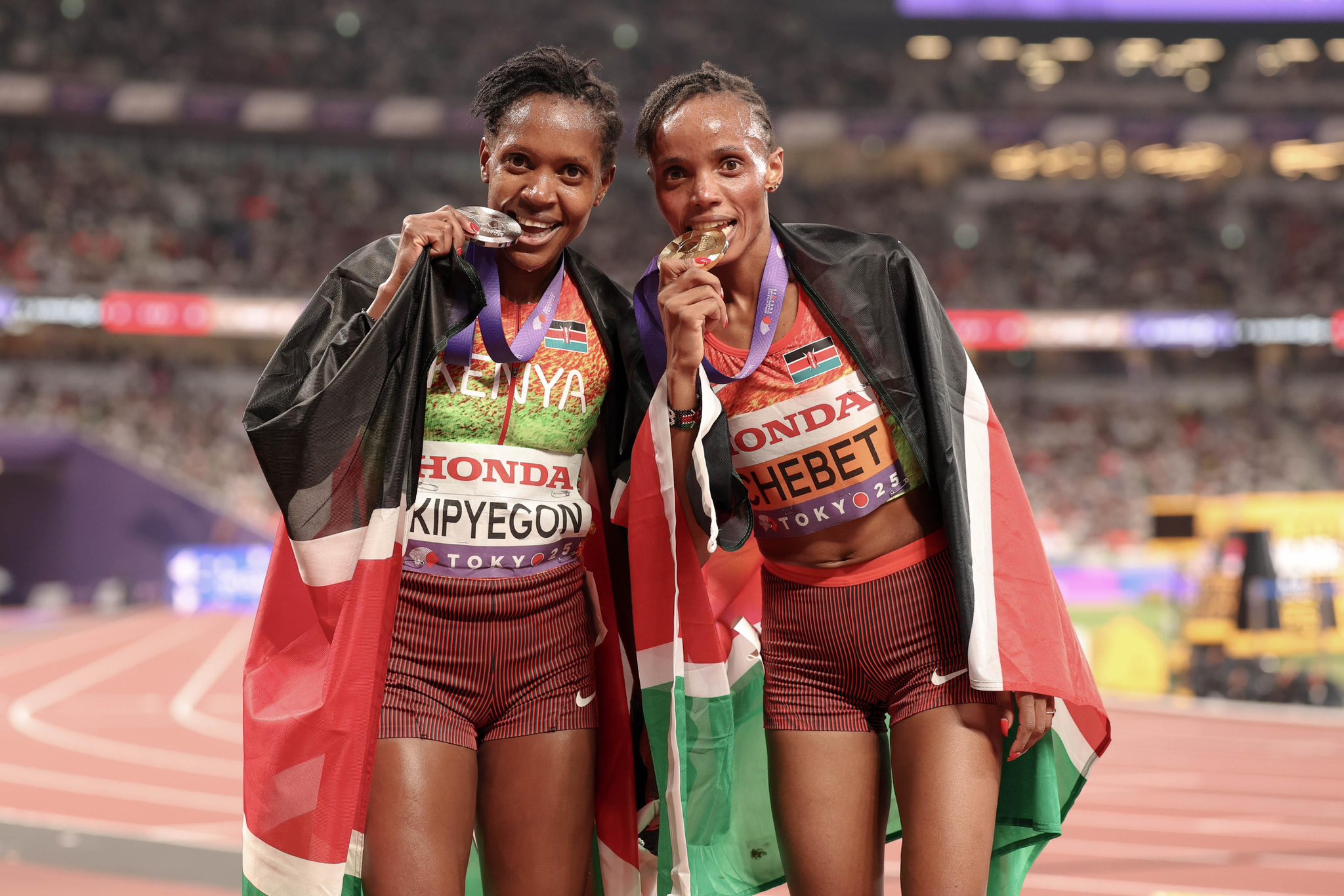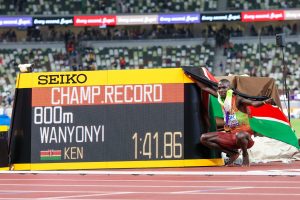News
Amount Each Kenyan Medallist Will Pocket From Tokyo Wins
The financial benefits extend beyond World Athletics prize money, with the Kenyan government implementing an enhanced reward scheme announced on September 3.

Kenya’s golden generation of athletes from the just-concluded 2025 World Athletics Championships in Tokyo are set to receive substantial financial rewards, with the country’s medallists earning a combined windfall exceeding Sh100 million from both World Athletics and government incentives.
Kenya secured 11 medals to emerge second in the world, delivering one of their most successful campaigns at the biennial championships held at Japan National Stadium from September 13-21.
The prize money structure established by World Athletics ensured that Kenya’s medal winners will receive significant compensation for their outstanding performances.
Individual athletes and relay teams will compete for prize money at the World Athletics Championships, which will be held in Tokyo from September 13th to 21st, 2025. There is a total prize money pot of US$8,498,000.
Individual Payouts
For individual events, each gold medallist earned $70,000 (Sh9.03 million), silver medallists received $35,000 (Sh4.5 million), and bronze medallists took home $22,000 (Sh2.8 million).
The prize structure extended to non-podium finishers, with fourth-placed athletes receiving $16,000 (Sh2.06 million), fifth-place finishers getting $11,000 (Sh1.4 million), and sixth-place finishers earning $7,000 (Sh900,000).
Athletes who finished seventh received $6,000 (Sh774,851), while eighth-place finishers were entitled to $5,000 (Sh645,709).
Kenya’s Medal Harvest
Kenya’s medal collection was spearheaded by the women’s team, which dominated middle and long-distance events.
Beatrice Chebet emerged as the championship’s biggest earner among Kenyan athletes, completing a memorable double when she won the 5,000m gold medal at the 2025 World Athletics Championships in Tokyo, Japan on Saturday, having earlier claimed the 10,000m title.
The complete list of Kenya’s medal winners includes Peres Jepchirchir, who secured the country’s first gold in the women’s marathon on the second day of competition.
Faith Kipyegon added to Kenya’s tally with gold in the women’s 1,500m, while also claiming silver in the 5,000m.
Faith Cherotich dominated the women’s 3,000m steeplechase, and Lilian Odira capped Kenya’s women’s success with victory in the 800m.
Emmanuel Wanyonyi led from start to finish, winning by just four-hundredths of a second from Djamel Sedjati in a new championship record to claim gold in the men’s 800m final.
Kenya’s silver medallists included Dorcas Ewoi in the women’s 1,500m, while Edmund Serem earned bronze in the men’s 3,000m steeplechase, and Reynold Cheruiyot claimed bronze in the men’s 1,500m.
Financial Breakdown
From World Athletics prize money alone, Kenya’s medallists will share Sh78 million. Chebet leads the earnings with Sh18.06 million from her double gold medal performance.
The remaining gold medallists – Jepchirchir, Cherotich, Kipyegon, Odira, and Wanyonyi – will each receive Sh9.03 million.
Silver medallists Kipyegon (for her 5,000m performance) and Ewoi will each take home Sh4.5 million, while bronze medallists Serem and Cheruiyot will receive Sh2.8 million each.
Enhanced Government Rewards
The financial benefits extend beyond World Athletics prize money, with the Kenyan government implementing an enhanced reward scheme announced on September 3.
Under the new structure, gold medallists receive Sh3 million, representing a four-fold increase from the previous Sh750,000.
Silver medallists now earn Sh2 million, up from Sh500,000, while bronze medallists receive Sh1 million, compared to the previous Sh350,000.
This government contribution adds Sh27 million to the athletes’ combined earnings, bringing the total payout to Sh105 million.
Chebet stands to benefit most from the enhanced scheme, potentially earning an additional Sh6 million from the government for her two gold medals, bringing her total earnings to approximately Sh24 million.
Global Prize Distribution
The championships’ substantial prize pool of $8.498 million (Sh1.094 billion) was distributed among medal winners across 49 events.
As per the prize money structure, Jefferson-Wooden will pocket $140,000 for winning the 100m and 200m gold medals, as $70,000 is the reward for each gold medal, while she will make an extra $20,000 for the relay gold, highlighting the lucrative nature of the competition for successful athletes.
Additionally, World Athletics and TDK Corporation offered a special $100,000 (Sh12.9 million) award for any world record performances, though only Sweden’s Mondo Duplantis qualified for this bonus after his world-breaking 6.30m pole vault effort.
Enhanced Daily Allowances
Beyond competition rewards, the government has also improved daily allowances for athletes representing Kenya abroad.
Each team member now receives between $60 (Sh7,800) and $200 (Sh26,000) in daily allowances, while officials earn between $80 and $300 daily.
The enhanced reward structure also extends to other major competitions, with Commonwealth Games gold medallists now receiving Sh2.5 million, up from Sh500,000, silver medallists earning Sh1.5 million compared to the previous Sh300,000, and bronze medallists receiving Sh1 million instead of Sh200,000.
Kenya’s strong performance in Tokyo, finishing second in the global medal standings, demonstrates the country’s continued dominance in middle and long-distance running while highlighting the significant financial benefits that accompany international athletic success.
The substantial payouts represent not only recognition for the athletes’ achievements but also the government’s commitment to incentivising excellence in sports, potentially inspiring the next generation of Kenyan athletes to pursue greatness on the global stage.
Kenya Insights allows guest blogging, if you want to be published on Kenya’s most authoritative and accurate blog, have an expose, news TIPS, story angles, human interest stories, drop us an email on [email protected] or via Telegram
-

 Grapevine1 week ago
Grapevine1 week agoAlleged Male Lover Claims His Life Is in Danger, Leaks Screenshots and Private Videos Linking SportPesa CEO Ronald Karauri
-

 Lifestyle1 week ago
Lifestyle1 week agoThe General’s Fall: From Barracks To Bankruptcy As Illness Ravages Karangi’s Memory And Empire
-

 Grapevine3 days ago
Grapevine3 days agoRussian Man’s Secret Sex Recordings Ignite Fury as Questions Mount Over Consent and Easy Pick-Ups in Nairobi
-

 Investigations2 weeks ago
Investigations2 weeks agoEpstein Files: Sultan bin Sulayem Bragged on His Closeness to President Uhuru Then His Firm DP World Controversially Won Port Construction in Kenya, Tanzania
-

 News2 weeks ago
News2 weeks agoAUDIT EXPOSES INEQUALITY IN STAREHE SCHOOLS: PARENTS BLED DRY AS FEES HIT Sh300,000 AGAINST Sh67,244 CAP
-

 Business2 weeks ago
Business2 weeks agoKRA Can Now Tax Unexplained Bank Deposits
-

 Investigations1 week ago
Investigations1 week agoEpstein’s Girlfriend Ghislaine Maxwell Frequently Visited Kenya As Files Reveal Local Secret Links With The Underage Sex Trafficking Ring
-

 News1 week ago
News1 week agoState Agency Exposes Five Top Names Linked To Poor Building Approvals In Nairobi, Recommends Dismissal After City Hall Probe
















